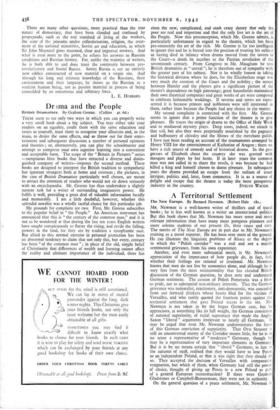Dr ma and the People
British Dramatists. By Graham Greene. (Coffins 45. 6d.)
THERE seem to me only two ways in which you can properly write a very small book about a big subject. You may either take your readers on an equality, credit them with the same education and tastes as yourself, trust them to recognise your allusions and, in the main, to desire the same effects, and so throw out for their enter- tainment and subsequent discussion a number of personal opinions and theories ; or, alternatively, you can play the schoolmaster and attempt to compress your own superior learning into a convenient and acceptable farm. The scope of the "Britain in Pictures" series —sumptuous little books that have attracted a diverse and distin- guished company of writers—imposes the second method. These books are designed to interpret the British tradition to sympathetic but ignorant strangers both at home and overseas ; the pictures, in the case of British Dramatists particularly well chosen, are meant to attract the attention of readers who would not sit down seriously with an encyclopaedia. Mr. Greene has thus undertaken a slightly austere task for a writer of outstanding imaginative power. He fulfils it well, providing a great deal of valuable information lucidly and memorably. I am a little doubtful, however, whether this splendid novelist was a wholly tactful choice for this particular job.
My grounds for complaint are two. First, Mr. Greene subscribes to the popular belief in "the People." An American statesman has announced that this is "the century of the common man," and it is not to be wondered at that during the last ten years English writers have sought conspicuously to flatter the rising, and revile the falling, powers in the land, for they are by tradition a sycophantic race. But allied to this normal exercise in personal protection has been an abnormal tendency to claim that not only this, but every, century has been "of the common man " ; in place of the old, simple belief of Christianity that differences of wealth and learning cannot affect the reality and ultimate importance of the individual, there has risen the new, complicated, and stark crazy theory that only the poor are real and important and that the only live art is the art of the People. Now this preconception, which Mr. Greene admits, is particularly unfortunate in regard to the theatre, which has been pre-eminently the art of the rich. Mr. Greene is far too intelligent to ignore this and he is forced into the position of treating his subject as having died in infancy when drama moved from the tavern to the Court—a death he ascribes to the Puritan revolution of the seventeenth century. From Congreve to Mr. Maugham he sees British dramatists as " unreal "; he is therefore out of sympathy with the greater part of his subject. Nor is he wholly honest in taking the historical division where he does, for the Elizabethan stage was very much the creation of the Court and the nobility ; the scenes between Hamlet and the players give a significant picture of the theatre's dependence on high patronage; great households Maintained their own theatrical companies and great works of art were composed to celebrate fashionable weddings. If taverns and stews are repre- sented it is because princes and noblemen were still interested in them, rather than because the People had any choice in the matter.
My second complaint is connected with the first. Mr. Greene seems to ignore that a prime function of the theatre is to give pleasure. He traces the origin of drama to the Office of Holy Week and to mediaeval mystery plays. Deep roots, indeed, we struck in that soil, but also they were perpetually nourished by the pageants and buffoonery of chivalry and the Shows of the merchant guilds. I have just been reading an account of the tournaments arranged by Henry VIII for the entertainment of Katharine of Aragon ; there we have a rich source of comedy and of historical drama. In the pro- gresses of Elizabeth about the country she was greeted with masques and plays by her hosts. If in later years the common man was not called in to share the revels, it was because he had killed a king and himself chosen to damn pleasure. In subsequent years the drama provided an escape from the tedium of court intrigue, politics and, later, from commerce. It is as a source of delight and escape that the theatre is today the most prosperous


























 Previous page
Previous page